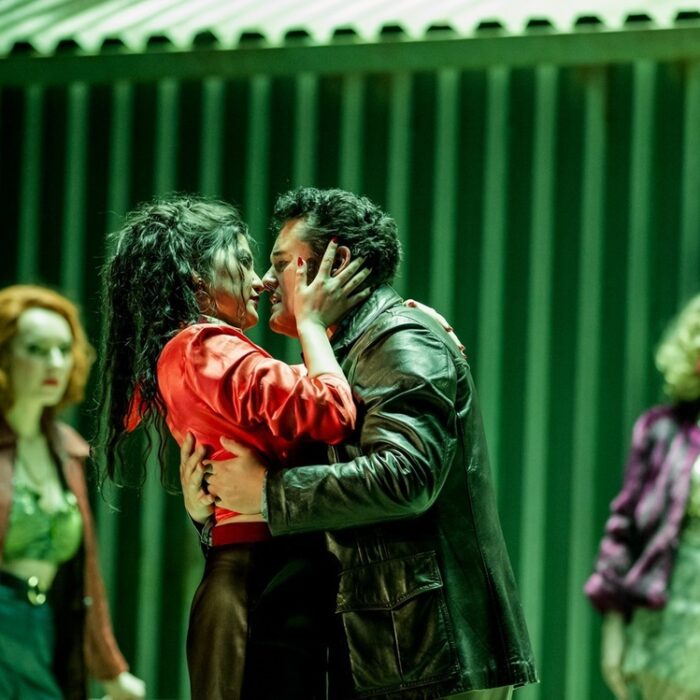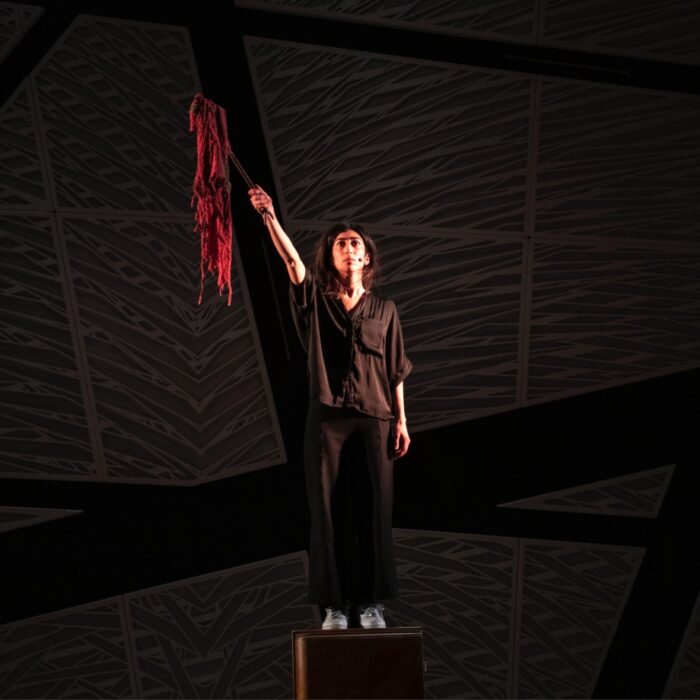
Young Concert Artists 2023 Review: 62nd Annual Gala
By Logan MartellOn May 8, 2023, Young Concert Artists (YCA) held their 62nd Annual Gala at Jazz at Lincoln Center. This year’s gala honored Deborah Borda, the President and CEO of the New York Philharmonic, for her accomplishments in service to the arts.
The concert was hosted by Kevin Joyce, who gave opening remarks before introducing YCA President Daniel Kellogg. “Tonight we gather to celebrate the remarkable Deborah Borda,” Kellogg began, “A true luminary in the world of classical music, and to celebrate the enduring legacy and community of YCA. We are deeply grateful to our gala co-chairs: Peter May, Oscar Tang, Barbara Tober, Sarah Solomon, Ann Ziff, as well as the entire benefit committee. Thank you. Your generosity has made this the most successful gala in our organization’s history. We are incredibly fortunate to have Paul Sekhri as our Board Chair and Gala Chair. With his unwavering dedication, generosity, and contagious enthusiasm for classical music, he’s the ideal leader for the YCA board. Paul’s special commitment to supporting the development of young musicians, coupled with his friendship with Deborah and many of you, has been the driving force for tonight’s successful event. Paul, we cannot thank you enough for your tireless efforts on behalf of YCA…
We are thrilled to have artists at every stage of their career represented here tonight. Carter Brey, Jeremy Denk, Annie-Marie McDermott, and George Li all began their impressive careers on the YCA roster, while Zhu Wang, Steven Banks, Joseph Parrish, and Nina Shekhar are just beginning notable careers through the partnership and work of YCA… At the heart of our work lies something intangible yet essential: young artists need someone who believes in them. When they join our roster they feel an incredible wave of support and encouragement from a large community. This support helps them grow exponentially as artists; witnessing this transformation is nothing short of incredible, and it is why we are so passionate about what we do.”
After some words from Paul Sekhri, the podium was turned over to Deborah Borda, who related some of her own thoughts on recent events. “Thank you so much to the YCA board and staff, but also to friends of the staff, friends of mine, and lovers of music. I have to say a very special thanks to the courageous and indomitable co-chairs of the NY Philharmonic, Oscar Tang and Peter May. They have been absolutely amazing in helping to guide this organization through the shoals of Covid. Not only did they do that, they came with me on a secret mission to Paris—it was tough job—to sign up Gustavo Dudamel, and they even sang “New York, New York” to him. Let’s say he came anyway. Oscar and Peter, I have stood on your shoulders and I thank you so much for what you have done for me, for New York, and for the New York Philharmonic…
Within 10 days of being shut down during the pandemic, we launched NY Phil Plays On; a streaming place where you could hear at first older concerts, then, for example, our musicians came together and they did a performance of “Boléro” from their homes. We had over 2 million hits on that. Of course Bandwagon, our little philharmonic truck that we drove all over the city for 81 concerts. To be there when it happened… They were pop-up concerts, people would be on the street and just stop to watch. Sometimes people would laugh, and be noisy, and then they would be quiet, and then sometimes people would dance or cry. We gave 81 concerts.
We all stood by the musicians of the orchestra during the crisis, our musicians stood by us during the ‘no-man’s season’ which was the year we were out of David Geffen Hall and moving all throughout the city; it was like a yearlong tour. It was tough, but they were great, they never relented. During this time we raised the money for the new David Geffen Hall, that was quite the accomplishment. Then on the seventh day we got Gustavo Dudamel. YCA also rose to this occasion. You gave financial support to young artists who needed it, emergency studio time, you streamed live concerts and two galas, and [did] something we could not do at the NY Phil: you held live auditions. So what’s the most major intersection between these two organizations? After almost six decades, you are part of NY Phil history and I’ll tell you why. How many of the artists that YCA supported made their New York debut with the philharmonic, or played subscription with us? It’s really a shared history, and it is something that’s so special about New York. Jonathan Swift once said ‘vision is the art of seeing what is invisible to others,’ and isn’t that what YCA does, and the New York Philharmonic as well? We have, together, changed the world of music, and together we will continue to do that. Thank you so much, for as you honor me, you honor the New York Philharmonic: New York’s oldest orchestra. In my money, the greatest orchestra.”
The concert was opened by renowned cellist Carter Brey, accompanied by Anne-Marie McDermott, for the andante from Rachmaninoff’s “Sonata in G Minor for Cello and Piano, Op. 19.” Joining the somber gentleness of the accompaniment, Brey illuminated the phrases with tremendous warmth and clarity. Both instruments sharing importance for the piece, it was fascinating to watch Brey and McDermott expound this section with utter finesse.
Following this was two pieces from pianist Zhu Wang. The first was “Light Up,” the fourth movement of Nina Shekhar’s 2014 composition “Postcards.” This modern piece opened with a lively hammering of a single note, underscored by a growing idea of running tones and chords, until these elements seemed to powerfully crash and join together. Wang dexterously plumbed through the registers to the very heights of the keyboard, before unfurling all this sound back down through swift and elegant runs to return to the bolstered initial material and its exuberant conclusion. His second piece was “Prelude for Paul,” written by John Corigliano for none other than Paul Sekhri. This piece saw a contemplative, haltering melody bottomed out by soft, ponderous chords with much tenderness, despite its minor key. These delicate themes soon led into fuller, rolling chords and pauses which gently rang with the remnants of these elements. Wang drew this musical tribute to a close with a captivating delicacy.
The next artist was saxophonist Steven Banks, performing “Strength of My Life” from his composition “Come As You Are,” accompanied by McDermott. As the soft melody of the accompaniment rolled into a bolder, more elaborate approach, Banks’ saxophone lines quickly displayed a remarkable beauty and ease of tone through expressive passages, articulate runs, and phrases which soared over rising staccato chords. What ensued was a mesmerizing showcase as Banks traced a wonderfully complete arc of idea and sound in a way I had never heard from a saxophone before.
Next on the program was a set from Chopin’s “Twenty Four Preludes, Op. 28,” played by George Li. This made for a virtuosic sampling of Chopin, from the bracing, chordal measures of “IX: Prelude in E Major: Largo,” passing through the flurry of tones in “X. Prelude in C-Sharp Minor: Molto allegro,” to the stately dance of “XI. Prelude in B Major: Vivace,” and bringing these ideas together for “XII. Prelude in G-sharp Minor: Presto.” This set was concluded with “XXVI. Prelude in D Minor: Allegro appassianato,” where Li displayed a wealth of skill. He laid out driving chords over a growing melody that burst into a variety of expressive glides and figures over this unceasing weight from the depths of the keyboard, powerfully sputtering to an end as Li drew magnificent nuance from the dying chords.
Following this was bass-baritone Joseph Parrish, accompanying himself on the piano for Leon Russell’s classic rock hit “A Song For You,” in the style of Ray Charles’ cover. Cascading from the higher reaches of the keyboard, the melody settled into a disconsolate texture, marked with tapering, dissonant chords. The weary plea of the lyrics translated beautifully through Parrish’s rich, lower voice, with the operatic weight resulting in an arresting and mighty call of heartache. Despite this weight and presence, his lines carried subtler emotions that rang through his phrasing, ranging from adoring to rueful, and backed by jazzy passing chords. Taking the accompaniment from the top with its descending melodic figure, Parrish opened the second verse with a powerful run of soulful colors that washed the hall in its emotion. These aspects made this popular song feel like it was his own, as he warmly outlined the refrain to bring all the prior strength and sorrow to a breathtaking pianissimo.
Returning to a classical setting was Bach’s “Prelude and Fugue in G Major, BWV 860,” played by renowned pianist Jeremy Denk. From its very first measure this piece ran with unceasing arpeggios laid out with flawless execution in a way that was as entertaining to watch as it was to hear, as these themes were explored and brought to a graceful and lighthearted close. Bringing the program to an end was the “Allegretto poco mosso” from César Franck’s “Sonata in A Major for Violin and Piano,” with Denk joined by one of the world’s leading violinists, Joshua Bell. The piece opened with a stately ease that soon expanded into a myriad of sounds and textures, laid out with such technique and fervor as only two artists of their stature could summon, making for a truly magnificent finish.
Monday’s concert was a powerful reminder of the impact that can be made by supporting young artists and giving them the means to help their talents flourish. From a variety of selections, both classical and current, the artists seized every chance to astound, and will no doubt continue to do so in their respective careers. As for YCA, the generosity of their supporters helped raise a record $1 million for the event, which will help the organization in its ongoing mission.



